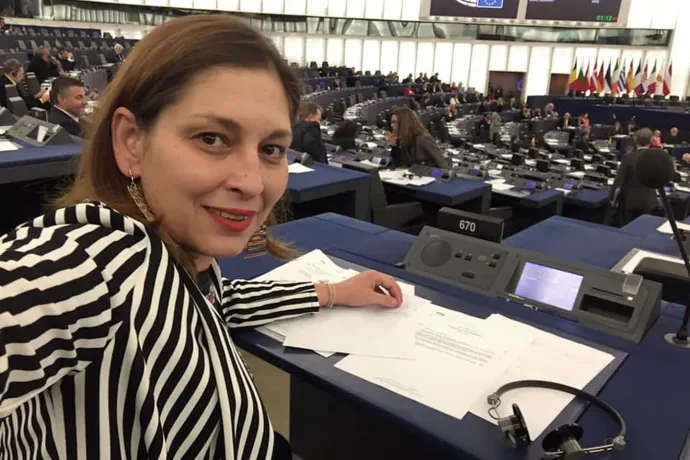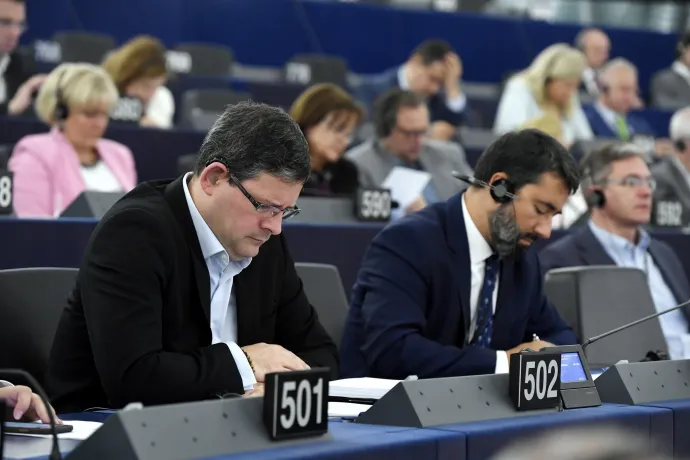
Fidesz MEPs are finally free to vote in the European Parliament independently of the left-leaning People's Party – says the governing party's message on how it’s dealing with the split with the centre-right in the EU which happened more than a year ago. We examined how much the Fidesz MEPs’ opinion has changed with this independence, and what similarities can be seen with the votes of their potential new allies. For now, they still vote mostly in harmony with the People’s Party, and they are more likely to vote with the liberals than with the Le Pen-Salvini block.
We are establishing “a new centre-right” – announced Matteo Salvini, leader of Italy’s Northern League party with Viktor Orbán last week. Following his landslide election victory in April, the Hungarian prime minister’s first trip was to Rome, in order to add a foreign ally to his victory at home. The fact that he did not go to Warsaw (as has been his custom after previous victories), and that this is the umpteenth time he has made such a vow shows the difficulties of the EU terrain.
Caught between two stools
Talk of a new centre-right was meant to be a stab at the old one, the European People’s Party (EPP). The weight of the political family from which the majority of the European Parliament and EU leaders come has been dwindling, and as of last year, Fidesz is not a member either. The Hungarian governing party came from the liberals in 2000, and the cooperation was apparently not disrupted by the fact that by the mid-2010’s, Orbán seemed to have begun playing a two-goal game.
“I am convinced that 2017 will be a year of rebellion” – he predicted, following the strengthening of the far-right after the refugee crisis. In light of the results of last weekend’s French and Slovenian elections, it looks like the much expected revolution will have to be postponed yet again. Meanwhile, even his own EU political group has gotten fed up with things due to the billboards against the European Commission’s former (EPP-member) president, Jean-Claude Juncker. Following the dubious domestic policy results of the campaign in 2019, the “terrible, but beloved child” became orphaned in its own party family, where it was suspended, and its fellow members did not come to its defense even when the EP initiated the procedure under article 7.
Finally, in March 2021, fleeing its increasingly certain suspension from parliament, Fidesz left on its own, rushing ahead like an aggressive little pig that claims it didn't fall off the bike, but always gets off like this. When giving a reason, Fidesz accused the EPP of having lost its Christian democratic roots, even though their coalition partner, the Christian Democratic party remained a member. (Since the most recent EU elections, György Hölvényi has represented the smaller Hungarian governing party in the EP. Although his name is not widely known in Hungary, he has been working around Fidesz-KDNP on church issues in Brussels and Strasbourg for a long time.)
For example, Katalin Novák said that “it has become clear in recent years that in most questions the EPP now represents left-wing values, and Fidesz is not able to identify with this”.
The outcasts of the EP stand to lose much
Having gotten into a group with those who do not fit into any of the EP groups, Fidesz ended up in strange company. One can find all kinds of things here starting from the Greek communists who consider even the EU far left too soft, through the Croatian anarchists and the Italian Five Stars Movement which proposes direct democracy, or the German joke party, to the classic far-right, and even the lonesome Jobbik – which despite its popularisation is still orphaned without an EU party family.
They are losing out on many benefits compared to their colleagues operating within party groups.
Some of these are financial (like the financial support of party foundations), but the groups’ secretaries may also relieve the burden of the MEPs’ assistants, not to mention the networking benefits that come with being part of a bigger group. However, the most important advantage remains that having the political support of a bigger party family is indispensable if one is to be appointed to better positions within the EP.
Fidesz managed to snatch one of the seats of the rapporteurs responsible for presenting draft proposals a few days ago, but marketing the recent midterm elections as a success was, to say the least, a bit over the top. They lost their former EP vice-presidential seat as Lívia Járóka received the fewest votes in the first round, which must be a painful loss not only for Fidesz but also for the EU Roma communities (although the fact that she was even nominated was an achievement in itself.) They also said goodbye to their vice-chair positions in committees that play an important role in decision-making, and on top of it they lost seats in some important groups.

It is in these sectioned committees that the proposed legislations are first discussed, so the representatives can work on the texts more efficiently, in a smaller group. Instead of these, Fidesz only received positions in examination committees and special committees, which are good for saying big things (from a Hungarian perspective, the one dealing with the Pegasus scandal should be especially exciting), but do not have much substantive impact. Meanwhile, Radio Free Europe reported that the EPP was actually able to increase its influence. (As we will later see, the specialised committees are very significant within Fidesz.)
Pulling the far right together is hard
It is then no coincidence that most parties are trying to belong to some group. The groups usually have some shared ideology, but there have been examples of a marriage of convenience too. Such was for example when the Five Star Movement – after talk of them joining the Greens or the Liberals – ended up joining Nigel Farage’s pro-Brexit UKIP and several smaller far right groupings. Although they tried to throw together a shared platform by talking about direct democracy, in the end, they could only pull together the most divisive group in the European Parliament at the time.
With Brexit and the British MEPs’ departure the group fell apart as they were no longer able to comply with the necessary conditions: to have at least 23 members representing at least 7 member states. This problem is quite typical to the right of the EPP, as
the far-right factions often shift, split, merge and send MPs back and forth between each other.
There are several reasons for the constant changes and complicated conflicts:
- National extremists tend to suck the air away from each other within member states. For example, during the final stage of the French presidential campaign, Nicolas Bay, one of the most important EPs of Marine Le Pen’s National Rally departed amidst turbulent circumstances after having decided he felt closer to the movement of the great rival, Eric Zemmour. He is now sitting with the independents, along with Fidesz, who had even invited him to the eve of the elections. It is similarly difficult to imagine bringing together Giorgia Meloni’s Italian Brotherhood with Matteo Salvini’s League.
- There is a shift in attitudes on the far right in the West, which has created a faultline in Holland and Austria at first, but has not yet taken root in the East: the anti semitic, homophobic ideology has been replaced by an anti-Islamic, gay-friendly attitude. Even though they are both anti-immigrant, in the West this is also applied to those from the East, although the conflict has been masked by the 2015 migration crisis. This division between East and West had even blown up a group which only existed for a few months as early as 2007, when the granddaughter of the fascist dictator, Benito Mussolini started insulting the Romanians.
- The gap between Russophobia, which tends to emerge in the East, and the friendliness towards Russia in the West has become significantly accentuated by the invasion of Ukraine, and so far the Kremlin's EU allies are more or less trying in vain to back out of it. The most obvious break caused by Russia’s attack is the one between Fidesz and the Polish Law and Justice Party.
- Meanwhile, conflicts inherited by neighbouring nations because of World War II land swaps are further complicating the situation. We should not only think of territories around Hungary in regards to this. For example, the Italian League sees the status of the Southern-Tyrol region which was annexed from Austria quite differently than the Freedom Party of Austria.
- There is also a race to become a People's Party, where the larger anti-EU parties are trying to prove their moderation by saying that they will not join forces with certain parties.
An opportunity instead of failure?
Several Fidesz MEPs, pro-government analysts and influencers have tried to turn the loss of EPP membership into an advantage instead of a disadvantage. MEP Kinga Gál for example said that exiting has given them "enormous freedom to contribute to the strengthening and renaissance of the European right".
For those familiar with the functioning of Fidesz’ EP faction, the statement is quite strange. Having a large number of MEPs in the EP, the governing parties are also able to gain seats on almost all special committees of importance to Hungary, and they have used this tactically. (For example, the PECH, which deals mostly with maritime fishing, is not that interesting for Hungarians.)
This gives them a deep insight into the proposals at an early stage and makes influencing them easier.
In previous cycles they have even been able to leverage this advantage from committees at the full plenary votes. Although the EPP provided a list which signaled which button should be pressed at the various votes according to the group, the members of the special committees could still override this, and thus the Fidesz MEPs received a modified list. (On this basis, fewer committee seats could even make it more difficult for Fidesz to make decisions that suit their interests, because they have less insight into EU decision-making.)

Although according to the EP’s website, the MEPs cannot be forced to vote a certain way, and the discipline within the factions is not nearly as strict as in the case of national parliaments, this has not always been true of everyone. For example, unlike the EPP, Fidesz voted against the report on the European Public Prosecutor’s Office, but József Szájer abstained from voting. As “chief whip” sitting in the front, he should have been the one to signal their joint stance to the EPP representatives, and as the letter he received from Fidesz’ EP delegation testified, his position made it impossible for him to vote directly against the EPP’s “yes” vote.
In response to a question, the EPP delegation confirmed that members who vote against the group's position do not have to fear sanctions, they only need to inform the group in advance. “This means that although members of the People’s Party, the Fidesz MEPs had the freedom to vote differently than the group.
The 'freedom' they gained by leaving the EPP is simply that no one in the European Parliament listens to them anymore, as they are no longer members of any of the groups that set the political agenda."
-wrote Pedro López de Pablo, the Group Secretariat's Director of Press Relations.
Although the EPP voting list alone could still have influenced the opinion of Fidesz MEPs, the recent vote on Russian sanctions showed that they are still inclined to vote with the majority even if it goes against their party's and the government's position (to put it mildly).
The numbers show an odd picture
For the sake of clarity, we examined all the results of roll-call votes available. Our goal was to see:
- whether Fidesz’ opinion truly became more independent, and how much it differs from that of the EPP – which, according to Katalin Novák has become leftist in most questions, and this is something they are unable to identify with
- whether the way Fidesz has been voting reflects them getting closer to the groups in which they claim to see potential allies
- and if so, then whether they have already become politically related to these formations.
We always compared the majority within the party and within the group based on whether they voted the same way.
(The European Parliament publishes how people voted, broken down into days and according to EU political group. The file names include the date, but with the scheme we are using, data for the session that started in July 2019 is only available from January 2020, so we examined the results from then on. We only looked at cases where at least one Fidesz MEP or group member voted.)
The data shows that
although Fidesz’ stance on some issues has indeed become different from that of the biggest EU faction, the MEPs of Hungary’s bigger governing party still agreed with the EPP the most.
When they were still EPP members, they voted the same as 85% of the majority opinion of the EPP. Since leaving, this percentage dropped to 73,7%, but is still the highest when compared with the other MEP groups. The Alliance of Conservatives and Reformists in Europe (ECR) is not far behind with 71,7 percent. The backbone of this alliance is the Polish Law and Justice Party (PiS), and while the Polish governing party has for long been one of Fidesz’ closest allies, the handling of the Russian invasion of Ukraine has alienated them from each other.
However, with the "independence" of the Fidesz MEPs, their voting patterns barely approached those of the eurosceptic group, with only a negligible 0.6% increase in their agreement rate.
They have moved significantly away from the left, and their agreement with the far-right Identity and Democracy (ID) has noticeably increased (from 50% to 56%), but even so, Fidesz MEPs still vote with them less often than with the majority of the liberal “Renew Europe” group. Matteo Salvini’s Italian League is one of the members of ID.
Thus, Fidesz will most likely be looking for allies wherever they can be found. Although there have been many rumours of the formation of a new party family, no tangible results are yet in sight. Even if it were to happen, the new formation would likely be left on the sidelines: while the conservative-eurosceptic ECR is somewhat accepted and is at times given moderately significant positions, the far-right group is almost completely marginalised. The ECR members would most likely not risk turning the tables, and it does not appear to pose a short-term threat to the comfortable majority of centre parties either. As seen above, it would be difficult to forge a cohesive, stable and mutually supportive group from the fragmented eurosceptic and anti-EU far-right.
Fidesz MEP Tamás Deutsch has previously hinted that it might be easier to put together such a formation at the beginning of 2022 because of the renewals, but that has now passed. A more distant, but much more promising opportunity seems to be the 2024 EP election, given that the political groups will have to be reconstituted then anyway.
This article is part of a V4 collaboration organized by Visegrad Insight. Participants include the Czech Denik.cz, DennikN.sk from Slovakia, Res Publica Nowa and Onet.pl from Poland and Telex.hu.
